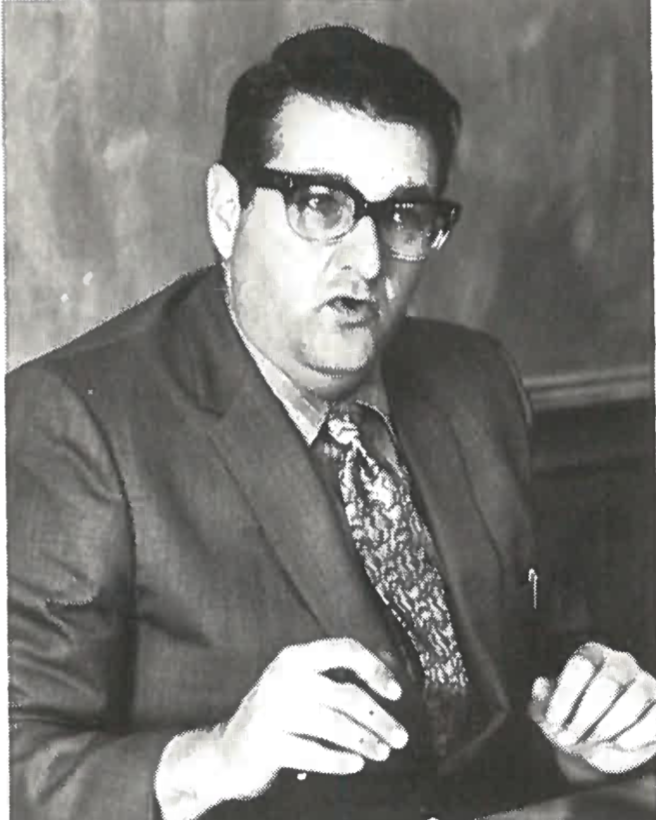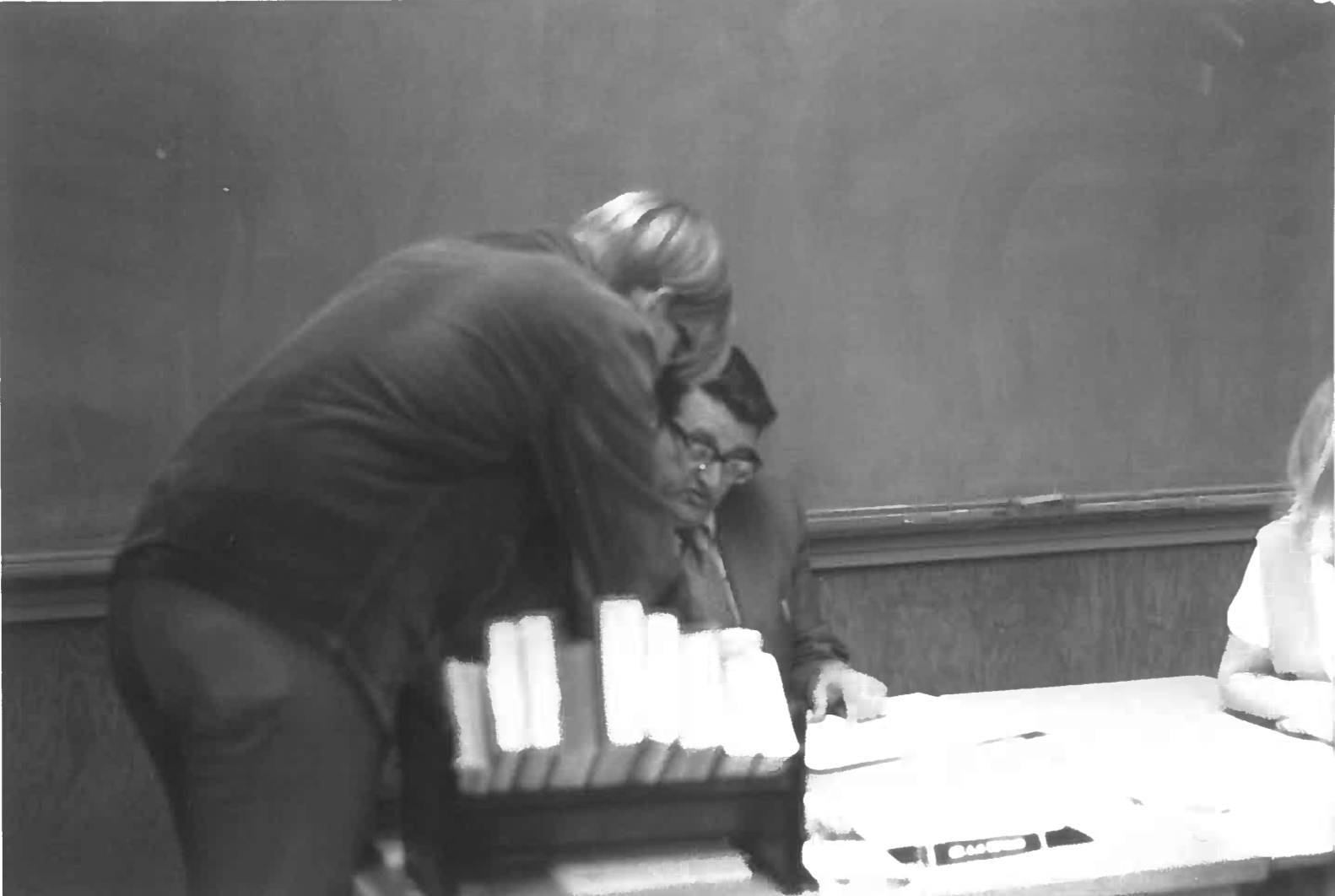|
LONGTIME
VENICE HIGH TEACHER A.H. ROTMAN DIES
by Rip
Rense
Oarsman Editor, 1970-71
|

Aaron H. "Bud" Rotman, 1971 |
Longtime Venice High School
English teacher and
Oarsman/Gondolier advisor A.H. “Bud” Rotman passed away July 7 in Meridian,
Idaho, after a long illness. He was 90.
Rotman
taught English literature, Shakespeare at Venice from 1958 to 1988, almost
all in bungalow 21, which came to be regarded as a kind of student salon.
For most of his tenure, he served as advisor to The Oarsman and the VHS
yearbook, Gondolier.
“Mister Rotman” was a popular, genial, jocular presence on campus,
down-to-earth in manner and in teaching technique. Dapper in bow-tie, with
thermos coffee cup ever at hand, he was to teach at Venice six classes per
semester, about 36 students per class---and similar numbers for summer
school and night (adult) school.
He
became a teacher, in fact, specifically to work at Venice High, telling the
Los Angeles Unified School District that he would accept no other job. He
loved the multi-culturalism of VHS in those years---the working-class muddle
of African-Americans, Asian-Americans, latinos, Jews, whites, the smattering
of Arabs, Filipinos, Pakistanis, etc.
A child of
Jewish immigrants who experienced anti-Semitism
and the stigma of being
"other,"
Rotman greeted every VHS student and colleague with “brother” and “sister,”
as in “Good morning, Brother Achmed,” and “Good morning, Sister Washington.”
He was always trying to put across the idea that all are created equal; that
everyone deserves a modicum of respect. At Venice, which was marked by
annual violent protests by African-American students in the late ‘60’s, this
was big, important stuff.
As an
English teacher, Rotman was able to impart Coleridge, Tennyson, Shakespeare
et al. to students who, in some cases, could barely write complete
sentences, whether due to ESL, or lack of skill. He made complex ideas in
the writing accessible; put them in plain language. His reading and acting
out, in clear, ringing tones, of the various parts of Shakespeare plays,
brought the works to life.
The
walls of room 21 were for decades marked by the names of dozens of great
writers--- painstakingly cut out, letter after letter, in large, ornate,
formal script, by Rotman. He wanted students to be impressed when they
entered his classroom, to at least get the subliminal idea that studying
English Literature and Shakespeare was a grand, serious affair. It certainly
was to him, a habitual reader who fell in love with words as a teenager.
As
Oarsman advisor, Rotman was both hands-off and guiding. He tried to give
student editors and reporters as much leeway as possible, stepping in with
suggestions, not orders, and rarely imposing any editorial control beyond
selecting the editor each year. He did, however, take a hand when he felt
strongly about an issue, and on some occasions, even penned editorials
(always approved by the staff.)
As
Gondolier advisor, Rotman had a strong part in the design of the yearbook.
He razor-cut together all of the photo collages that were characteristic
during his years, and was responsible for not a few gag photos.
Sometimes as much learning took place in room 21 between classes as during,
with Rotman presiding. He teased out, evoked, inspired, sometimes provoked
discussion, argument. This is not to say it was necessarily polite or
restrained, as it often wasn’t. Impassioned was the norm in room 21. Rotman,
a self-professed patriot, conservative, and Navy veteran, would debate
leftist students in the late ‘60’s, and they would either join the debate,
or leave the room in a huff. (Possibly followed by the man's frequent
admonition, "Close the door! Do you live in a barn?")
|
He was always trying to put across the idea that all
are created equal; that everyone deserves a modicum of respect. At
Venice, which was marked by annual violent protests by
African-American students in the late ‘60’s, this was big, important
stuff. |
Rotman
adored music, from the Ink Spots, Fats Waller, Harry Belafonte to his
greatest love, classical music and opera. He was fairly expert in his
knowledge of the latter, and in another unorthodox bit of teaching panache,
he founded the Venice High Classical Music Club, where for many years
interested students sat quietly in room 21---during lunch---listening to
symphonies, concertos, sonatas, arias. Rotman would hold forth about
Sibelius’s Fifth (his favorite symphony), Beethoven, the great tenor, Jussi
Bjorling, the cantorial singing of Richard Tucker. He was given to, on
occasion, bursting into song, himself---sometimes a cantorial hymn (sung
credibly), and other times, less sober utterances. For example: many were
the times he would suddenly rise from his desk, coffee cup in hand (always
with low-acid Kava), and boom, “Toreador-ay, don’t spit on the floor-ay! Use
a cuspidor-ay, that’s-uh what it’s for-ay!”
Aaron
Hirsh Rotman was born Feb. 8, 1928 on the south side of Chicago, the third
son of Ada and Samuel Rotman, a Jewish immigrant from the Ukraine who gave
up everything for the freedom of America. As a toddler, Aaron’s inability to
say “brother,” somehow morphed into “Buddy,” and his lifelong nickname was
born.
The
Rotman family was too often treated as second class, as was the case with so
many immigrants of the era, and these memories imprinted on young Buddy. One
imagines the boy’s confusion over the cruelties of the world, the widespread
anti-Semitism, and his fledgling resourcefulness. It was here that his
characteristic friendliness and geniality took root. He was “always looking
for a connection with everyone he met,” as his son, Mark, put it. “If a
connection could be made, then communication could start, and that was the
basis of friendship.” (When he retired to decidedly un-Jewish Meridian,
Idaho, the man read up on the surprisingly extensive history of Jewish
immigrants in the western U.S., as a sort of conversational put-you-at-ease
fare for use with new friends.)
In
another important imprinting experience, young Buddy was disturbed by the
condescending demeanor of some of his teachers. It is not a great leap to
deduce that this formed the basis of his unpretentious approach to teaching.
He never talked down to his students.
The
Crash of ’29 also crashed the Rotman family, which lost everything, and
Buddy, brothers Lionel and Willie, and baby sister Margie (who Rotman would
look out for throughout her life) had to scrap. Details are sketchy, but
they did manage to claw their way back, winding up owners of a candy
warehouse. World War II came along, and the older Rotman brothers served in
the military in non-combat roles. Bud enlisted in the Navy as soon as he was
old enough, but the war was over, and he wound up with an early IBM computer
group at the Pentagon.
|

Rotman going over some copy with Oarsman Sports Editor
Brad Remington in 1971. |
During
subsequent military downsizing, and due to flat feet, Rotman was discharged
early and followed the family to L.A., where his father owned VSQ Liquors in
mid-city. And things started clicking. An old Navy friend introduced Bud to
one Sharlene Kahn, a recent Fairfax High graduate, and they were married in
1948. (They would remain together until her passing in 2017, an astonishing
69 years together.) Rotman went to work full-time at VSQ, earning a BA in
English and teaching credential at the same time. Son Mark came along in
1950, and Donn in 1952. In 1958, he became “Mister Rotman,” joining the
staff of Venice High---yet would always work two, often three jobs, to
support family and a nice, modest post-war house on Everglade Street in Mar
Vista.
One of
those extra jobs was master carpenter---learned in the Venice High wood
shop, under teacher Edgar Lanning. “He couldn’t afford to hire workmen for
maintenance and construction on a teacher’s salary, so he just learned it
all, himself,” as his son, Mark, remembered. In time, Rotman’s handsome
cabinets, desks, podiums (which graced several Venice High classrooms), came
to be sought after; he always had a long waiting list of orders. Several
years ago, a friend ran into a former Venice High teaching colleague, Harvey
Felsen. One of the first things Felsen said was, “He was a hell of a
carpenter. He redid my kitchen!”
One
indicator of the man’s extraordinary impact is the fact that it is rare to
meet someone who went to Venice during Rotman’s years who does not remember
him. Take Maria (not her real name), a student in the mid-‘60’s, severely
oppressed and psychologically abused by her mother. Not surprisingly, Maria
rebelled, wound up pregnant, and dropped out of school in shame, continuing
in the anonymity of adult night school. Frightened, depressed, distressed,
alone, sixteen-year-old Maria found herself in Rotman’s English class---and
found herself treated as if she was worthwhile. “Sister Maria, how are you
this evening?” To this day, she talks about how important this was, and what
a difference this man made in her life. (And she raised a good daughter, to
boot.)
In
1979, Mr. Rotman was part of a lengthy Thanksgiving article in the old L.A.
Herald Examiner, a kind of survey of good things still to be found in L.A..
The reporter, another former student, had visited the man in room 21 as he
was packing up to go home after his last class of the day, sophomore
English. Here is the end of the article.
“You
know,” said Rotman, “this may sound jaded, but the ones in the city who are
really thankful are the foreigners; the immigrants. I still teach night
adult school English, where there are a lot of people new to the language.
We had a discussion the other night---oh, it was beautiful. A Sicilian
student actually stood up in class and began shouting, ‘You should-uh get
down on you knees every-a-day and-uh thank-uh GOD you are in this country!”
“It
was gorgeous,” he said.
A.H.
Rotman is survived by his sons, Mark and Donn, of Meridian, Idaho, and four
grandchildren.
|

A "paver" on the front lawn of Venice High School created
several years ago by former students. |
BACK TO PAGE ONE |
![]() Riposte Archive
Riposte Archive